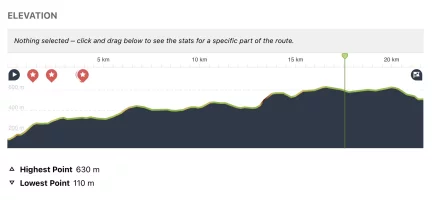JustOneGuy
Active Member
- Time of past OR future Camino
- Aug 2024: GR130, Apr 25: Camino Primitivo?
Yesterday with a couple of friends, my partner and I went for a long walk in the mountains of the island where we live: 22 km in total and 960 m of elevation gain uphill. Nice temperature (16-18 C). Everything went well, we had a great time despite some rain, until, arriving after about 6 hours in a small village where we thought we would get a “bocadillo” (sandwich) before catching a bus back, my wife sat down and started to feel sick. Shortly thereafter she fainted.
We immediately called an ambulance that arrived after about 20 minutes (we were in a small, isolated town) and transferred her to a medical center where they examined her: hypoglycemia. On the way she vomited, which looks typical.
All other values-pressure, heart rate, blood oxygen were perfectly normal. They gave her a glucose and anti-nausea drip and we took her home soon after. She has had periodic blood tests at the same center recently, but she is still waiting for the results.
I am mainly to blame : first, it was the first time my wife, who is a good walker in good physical shape for her age (62) anyway, covered such a distance in the mountains (and I insisted to convince her...). Second - I had prepared a good quality bag of various high-quality supplements and food, but.. it was left at home when I made changes in my backpack at the last moment. We just had some bread and Parmigiano Reggiano with us, plus 3 liters water, but she didn't eat and drink very much of them.
: first, it was the first time my wife, who is a good walker in good physical shape for her age (62) anyway, covered such a distance in the mountains (and I insisted to convince her...). Second - I had prepared a good quality bag of various high-quality supplements and food, but.. it was left at home when I made changes in my backpack at the last moment. We just had some bread and Parmigiano Reggiano with us, plus 3 liters water, but she didn't eat and drink very much of them.
My question is whether you think it is appropriate to continue with these hikes, including - of course - trying to make more stops for drinking and eating? This is her first time but other times, looking back, she had felt almost faint, only we had underestimated it.
By the way, she totally recovered although we are staying at home just relaxing today.
I will end by saying that the staff at the bar was of absolute kindness, helping us, talking to the 112 instead of me (who speaks Spanish only as a second language), smiling and trying to comfort me with a courtesy that, thinking back, literally brings tears to my eyes. They also vacated one of the rooms in the bar for us. The ambulance and medical center staff were also of absolutely outstanding competence, professionalism, and kindness.
And all completely free of course: we are in Spain.
Thank you Europe, for existing and being the place where I live!
We immediately called an ambulance that arrived after about 20 minutes (we were in a small, isolated town) and transferred her to a medical center where they examined her: hypoglycemia. On the way she vomited, which looks typical.
All other values-pressure, heart rate, blood oxygen were perfectly normal. They gave her a glucose and anti-nausea drip and we took her home soon after. She has had periodic blood tests at the same center recently, but she is still waiting for the results.
I am mainly to blame
My question is whether you think it is appropriate to continue with these hikes, including - of course - trying to make more stops for drinking and eating? This is her first time but other times, looking back, she had felt almost faint, only we had underestimated it.
By the way, she totally recovered although we are staying at home just relaxing today.
I will end by saying that the staff at the bar was of absolute kindness, helping us, talking to the 112 instead of me (who speaks Spanish only as a second language), smiling and trying to comfort me with a courtesy that, thinking back, literally brings tears to my eyes. They also vacated one of the rooms in the bar for us. The ambulance and medical center staff were also of absolutely outstanding competence, professionalism, and kindness.
And all completely free of course: we are in Spain.
Thank you Europe, for existing and being the place where I live!
Last edited:


















